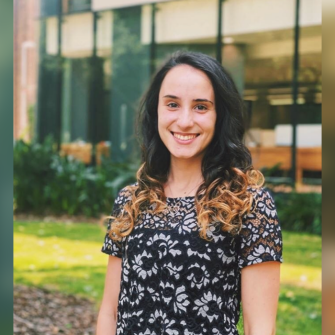Bachelor of Criminology & Criminal Justice (Honours)
- Commencing Terms
- Term 1
- Duration
- 1 Year(s)
- Delivery Mode
- Face-to-face (includes blended)
- Campus
-
Kensington
- Codes
- Program code 4505
- CRICOS code 082791G
-
ATAR/2025 lowest selection rank
- N/A View all admission criteria
-
2026 Indicative first year full fee
- $17,500*
-
2026 Indicative full fee to complete degree
- $17,500*
-
2026 Indicative first year full fee
- $49,500*
-
2026 Indicative full fee to complete degree
- $50,500*
Join us at Info Day
Thursday, 18 December | 12–4pm | Kensington campus
Join us on campus to get personalised advice on your study options before UAC preferences close. Info Day is the perfect opportunity to get all of your last minute questions answered, the day ATARs are released.
Application closures for 2026
Undergraduate programs for 2026 intakes are closed for New Overseas Student Commencement (NOSC) applications. Applications for postgraduate programs remain open. Find out if this closure applies to you.
- Overview
- Entry requirements
- What will I study?
- Future careers
- How to apply
- Fees & Scholarships
Overview
The Honours Program in Criminology is designed will provide you with appropriate training and guidance for the completion of a major piece of criminological research. Graduates of the Program should be able to demonstrate their ability as autonomous researchers and are well-prepared for a research and/or policy career in criminology in a variety of organisational settings.
Why study at UNSW?
World-class Scholarship
Learn from the minds at the forefront of research and industry knowledge at UNSW Law & Justice, ranked #1 in Australia and #12 globally for law and legal studies (QS World University Rankings by Subject, 2025). Gain a breadth of knowledge in our leading Bachelor of Criminology & Criminal Justice (Honours). Our program is ranked #1 in New South Wales for criminology (Excellence in Research for Australia Report, 2018) and brings together knowledge from the School of Law, Society and Criminology, and School of Social Sciences.
Crime and Justice Research Networks
Through seminars, conferences, workshops and internship opportunities, you’ll have the chance to engage with UNSW’s world-leading research centres and build your profile within the justice sector. UNSW is home to the Centre for Crime, Law and Justice (CCLJ), Gendered Violence Research Network (GVRN), Australian Human Rights Institute, Social Policy Research Centre (SPRC), National Drug and Alcohol Research Centre (NDARC) and Kirby Institute.
Exclusive Career Support
Graduate career-ready with UNSW Law & Justice’s in-house careers service, dedicated to our students and alumni. The service includes a jobs board and a range of resources, presentations and workshops to maximise your employability.
Global Student Opportunities
UNSW is one of Australia’s most international universities. Student exchange is a great way to immerse yourself in another culture, discover different perspectives and global experiences with over 300 hosts across 38 countries.
Want to see more from UNSW Law and Justice?
Entry requirements
Find out more about entry requirements for this program in the Degree Handbook.
-
- The 2025 Lowest Selection Rank (LSR) is the adjusted rank (ATAR plus adjustment factors) you would have needed to gain entry to this degree in 2025.
- The 2025 A levels score is based on four Advanced Level (A2) subjects. Entry scores are calculated from the best three or four A2 subjects (excluding repeated subjects) using the following values: A*=6, A=5, B=4, C=3, D=2, E=1. At most one Applied A Level subject may be included in the best four subjects used to calculate the aggregate.
- The 2025 IB Diploma is an indication of the IB you would have needed to gain entry to this degree in 2025. It is to be used as a guide only.
- The 2025 Lowest ATAR is the lowest ATAR (before adjustment factors were applied) to which an offer was made. Where <5 is listed, this indicates that less than 5 ATAR-based offers were made and so the score has not been published. N/A indicates no offers were made on the basis of ATAR.
*The Lowest ATAR to which an offer was made, for this program, is based on a UNSW Gateway Early Conditional Offer.
-
At UNSW, we are committed to ensuring prospective students have all the information they need in order to make informed decisions about their study options.
To assist you in gaining a better understanding of how Admissions works at UNSW, we have provided you with a summary of ATAR offers and the student profile.
We hope this information will help you identify the degree that is right for you.
Adjustment Factors
We offer a range of adjustment factor schemes that reward students for academic performance and extra-curricular achievements. These schemes also take into account a range of personal and educational disadvantages that may have affected your studies.
HSC Plus
This scheme rewards students who perform well in Year 12 subjects that are relevant to their preferred UNSW degree. You may be awarded up to five points.
Elite Athletes, Performers and Leaders (EAPL)
This program recognises achievements in the areas of sport, academia, leadership and music at an elite level. You may be eligible for up to five points.
Educational Access Scheme (EAS)
Factors such as illness, financial hardship, language difficulties or attending a particular school can mean you don't always get the best possible marks in Years 11 and 12. If one of these situations applies to you, submit an application for the Educational Access Scheme (EAS) via UAC. Eligible students can receive between 1 and 10 points towards their chosen UNSW degree.
Admission pathways
Your ATAR is not the only measure of your potential to succeed, which is why we offer a range of pathways into university. Explore your options below and get in touch with our Future Student Advisers to discuss your path to UNSW.
Gateway Admission Pathway
This scheme is open to students who attend Gateway schools, live in a low-socioeconomic area based on IRSAD and IEO indexes of SEIFA criteria, or are an Aboriginal and Torres Strait Islander person. It adjusts the ATAR requirements for your preferred UNSW degree and provides early offers and early conditional offers to UNSW.
Entry programs for Australian Aboriginal and Torres Strait Islander people
We offer entry programs for Indigenous Australians, including the Indigenous Preparatory Programs and the Indigenous Admission Scheme (IAS). The entry pathway program you apply for will depend on the degree you want to study.
English language requirements
You may be asked to provide evidence of your English proficiency to study at UNSW depending on your educational background and citizenship. English language skills are vitally important for coping with lectures, tutorials, assignments and examinations - this is why UNSW requires a minimum English language competency for enrolment.
If you’re completing an Australian Year 12 qualification (e.g. NSW HSC or equivalent), you do not need to provide anything extra to prove your proficiency. Your qualification will be used as evidence of your English proficiency.
If you do need to provide evidence of your English proficiency, this will be indicated in your application. You can prove this by providing evidence that you meet one or more of the following criteria:
- English language tests and university English courses
- Prior study in the medium of English
- Other qualifications
If you need to improve your English skills before you start your degree, UNSW College’s Academic English Programs are for you. The programs are suitable for various English levels and help you prepare for university studies and life in Australia.
For more details, visit the English Language Requirements page.
Entry requirements
Find out more about entry requirements for this program in the Degree Handbook.
Admission pathways
If you do not meet the requirements for direct entry into your chosen degree, you may be eligible for a pathway program with UNSW College. UNSW College provides alternative entry options using university-approved content so that you can start your UNSW journey with confidence.
English language requirements
You may be asked to provide evidence of your English proficiency to study at UNSW depending on whether you are from an English-speaking background or non-English speaking background. English language skills are vitally important for coping with lectures, tutorials, assignments and examinations - this is why UNSW requires a minimum English language competency for enrolment.
If English is not your first language, you’ll need to provide proof of your English proficiency before you can be given an offer to study at UNSW. You can do this by providing evidence that you meet one or more of the following criteria:
- English language tests and university English courses
- Prior study in the medium of English
- Other qualifications
If you need to improve your English skills before you start your degree, UNSW College’s Academic English Programs are for you. The programs are suitable for various English levels and help you prepare for university studies and life in Australia.
For more details, visit the English Language Requirements page.
Check the specific English language requirements for this program
What will I study?
UNSW is introducing a new academic calendar from 2028.
We are moving to a new flex-semester calendar. What does this mean for your studies?
Full program structure
Future careers
Potential careers
- Research and analysis
- Policy design and advising
- Project management
- Crime prevention
- Courts and Corrective Services
- Federal and State Police
- Security and intelligence
- Insurance
- Finance
- Risk assessment and management
How to apply
Students intending to apply to the honours program must first discuss their eligibility and study program with the Honours Convenor in the relevant school prior to submitting an application.
Ready to start your application?
Students intending to apply to the honours program must first discuss their eligibility and study program with the Honours Convenor in the relevant school prior to submitting an application.
Ready to start your application?
Fees & Scholarships
Commonwealth Supported Place multiple Student Contribution Bands may apply for this double degree. See single degrees for the applicable fee bands.* The student contribution for a Commonwealth Supported Place is an indication only of the amount payable in Year 1 based on a standard full-time load of 48 credit points (1.0 EFTSL). The actual student contribution you will be liable for depends on your individual program of study and the calendar year in which you enrol. Actual fees are calculated upon enrolment. Student contribution amounts are subject to annual review by the University and may increase each year during your studies (subject to caps determined by the Australian Government), effective at the start of each calendar year. The indicative fees listed here are based on an estimated average and are for tuition only other fees and charges are not included.
*Fees are subject to annual review by the University and may increase annually, with the new fees effective from the start of each calendar year. The indicative fees listed here are based on an estimated average and are for tuition only, other fees and charges are not included. The amount you pay will vary depending on the calendar year to enrol, the courses you select and whether your study load is more or less than 1 Equivalent Full Time Student Load (8 courses per year).
Indicative fees are a guide for comparison only based on current conditions and available data. You should not rely on indicative fees. More information on fees can be found at the UNSW fees website.
Indicative fees to complete the program have been calculated based on a percentage increase for every year of the program. Fee increases are assessed annually and may exceed the indicative figures listed here.
Indicative fees to complete the program include tuition plus an estimate of study-related costs of approximately $1,000 per year. To find out more about other costs, visit UNSW International.
Scholarships
At UNSW, we award over $83 million in scholarships each year. We pride ourselves on rewarding excellence and making university accessible to students from all walks of life. Whether you’re a domestic or international student, our range of scholarships, prizes and awards can support your journey.
Progress starts here – at a world-leading university

Top 20 Worldwide
Ranked in the global top 20 for three consecutive years
QS World University Rankings, 2024–2026

Winner of the AFR Most Employable University Award six years in a row
AFR Top100 Future Leaders Awards, 2020–2025

Australia's #1 for Innovation
Highest number of startups and spinouts from university-developed tech
SCOPR report, 2024





